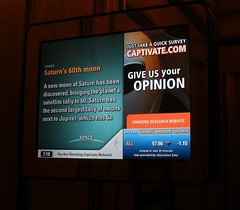June 30, 2008
FRA and Dog Poo
If I have to choose, I will stand with the libertarians. Even though I am standing in dog poo.
Spy cameras: We are paranoid, but they're still out to get us | Alice Miles - Times Online
Alice Miles makes some salient observations about the UK authorities use of surveillance:
It is the covert surveillance that has got everybody's goat. And the reason that covert surveillance annoys people is that we have become paranoid. We assume that Britain is filled with petty, vindictive bureaucrats with hidden powers over our lives, who are “out to get us”.There is a coalescence of outrage around rubbish spies and bin taxes, around distant bureaucracy and speed cameras and parking fines; around the myriad ways that the State can intrude upon one's life without warning and force you to pay to make it go away again. And never be forced to explain itself.
This paranoia is understandable. The State doesn't answer the phone to you but it does have the power to threaten and bully you, to make you pay or to threaten your credit rating with a county court judgment - even though, if it would only listen to you, you are being perfectly reasonable.
I think this is exactly the answer to the opinion piece from Ingvar Åkesson, the director general of FRA this week where he, in a tone of injured friendliness, argues that his agency and the law giving it more power have been misunderstood all along. They are not meant to spy on Swedish citizens, just those misty threats out there. Like the activities of foreign nations - which of course make eminently tradeable intelligence information. Åkesson cannot understand how these paranoid delusions came about that FRA aims at spying on everybody - that is not the point of the organisation.
But what the protesting citizens are protesting against isn't international intelligence gathering, it is the very likely mission creep. If there is a tool to gather information that could be used for something constructive, it is unlikely it will remain unused for this purpose. In the US anti-drug policing gets snuck into anti-terrorism programs. In the UK the Regulation of Investigatory Powers Act of 2000 gave 9 organisations the right to authorise surveillance. Today 786 organisations have that right, including the ambulance service and local authorities. In 2006 there were ~1000 applications per day for using these powers. The Swedish PKU registry was only intended for medical and scientific use, now it is being opened for police use while scientific use is curtailed. Swedish municipalities already hire people to spy on garbage disposal: it would likely be more efficient and cheap to use automated surveillance. Past Swedish cabinets have been involved in attempts to setting up investigations outside the legal system. And so on.
Given the experiences in the US and UK of how surveillance powers are extended and used for purposes far outside their original area, it would be foolish to assume the same process would not occur in Sweden. In particular, it would be extremely hard to monitor abuses and many could be swept under the rug with vague references to national security. This means that the system would be unaccountable and hard to influence, even when it makes serious mistakes.
What Reinfeldt, Åkesson, Bildt et al. have not understood is that the outrage they are meeting is not about the particular proposal, but that the trust credit of the Swedish government has run out. The state runs on the trust of the citizens: the main reason its commands are obeyed without coercion is that they are trusted. A government that is no longer trusted will find a the country to be far less governable: the friction of every transaction goes up. The price for finding people who do not pick up dog poo or mis-sort their garbage may be not just reduced GDP growth but political instability.
June 28, 2008
Genetic Gatekeepers in the Hype Cycle
 I blog on CNE about our right to be allowed to look into our genome, infringed by California in insisting that only doctors can order such "medical" tests. But genetic testing is moving the same way as pregnancy tests - they are becoming consumer commodities.
I blog on CNE about our right to be allowed to look into our genome, infringed by California in insisting that only doctors can order such "medical" tests. But genetic testing is moving the same way as pregnancy tests - they are becoming consumer commodities.
They might also be used for many things other than traditional medicine - not just prevention, but lifestyle (am I at higher risk for cocaine addiction if I try the drug? (but see also this)), art or why not personality self-profiling (always popular). After all, the Japanese use the "medical information" of blood groups for more or less tounge-in-cheek personality profiles.
What needs to be solved is the imbalance between early excessive expectations and high prices, and the later more useful, cheap and everyday use of the tests. We are at the approach to the peak of the hype cycle and even without stupid interventions soon many of the golddiggers in the field will suffer. But asking physicians to be gatekeepers is unlikely to either speed this process up (because they generally have a hard time interpreting the data; what is really needed is bioinformatics savvy genetic councellors) or avoiding the trough (since people need to get over their silly genetic determinism anyway).
June 27, 2008
Straining at gnats and swallowing elephants
 Charles Stross explains exactly what is wrong with much environmental thinking today:
Charles Stross explains exactly what is wrong with much environmental thinking today:
The belief that because doing something about climate change (and environmental degradation and peak oil and the whole dismal litany) is better than doing nothing, any particular something they can point to clearly must be done, however irrelevant it might be to dealing with the underlying problem. It generates make-work, an annoying wheel-spinning tail-chasing pursuit of distractions, at the cost of grappling with the very real and very serious problems we face.
Stross does a little numerical example, showing how the whole anti-standby mode argument is at best just a morale-building exercise (and at worst just wasted time and effort). Making agriculture a bit more efficient is going to have a far bigger effect energy- and CO2-wise.
We have a strong action bias, especially if we are in situations of power or are asked what to do: saying that sometimes it is actually better to do nothing. Politicians are elected to do something rather than just safeguard what already works. Experts that don't claim it is urgent to implement their pet solution will be passed over for the experts screaming that something must be done before it is too late.
Something we often forget is that future generations will be a lot more rich and well-informed than us. There are some problems that it actually makes sense to leave to them, or at least expect that they will reverse our early and shoddy policies. We should focus on the things where we actually have the biggest effects, even if it doesn't involve symbolic individual actions.
Small is more beautiful than Bruce Willis
 On ethical perspectives on the news I blog about Practical Ethics: Duck and cover: how expensive does impact safety have to be?
On ethical perspectives on the news I blog about Practical Ethics: Duck and cover: how expensive does impact safety have to be?
Based on the coverage in Nature, I argue that NEO defence can be done in a rather low-key fashion: continued tracking, development of better impact prediction models and setting up civil defence plans for imminent impact. This could all be done for pretty low investments, completely unlike most macho planetary defence programs but likely much more effective in reducing risk.
The big problem is of course that unglamorous, inexpensive programs don't get you elected and will not be the foundation for a great administrative empire. Maybe we need to scale up existential risk threat management projects into a big government concern for it to happen. Suddenly it would be a good career move to be manager of Refuge Cave Red 8 or Planetary Protection Officer. Of course, we should also expect a tremendous amount of waste in such a scaling-up, including just as many useless projects and as much mission creep as in any normal-sized War Against X. It would be interesting to analyse the cost per life-year saved for differently sized projects. I expect that saving mankind from many disasters can be done very cheaply, but that doing it reliably may be very costly.
June 24, 2008
Don't Scare the Kids and Grant Bodies!
So, stop talking about brain implants like they'll be used to control planet-seized sentient robots that can time travel and fight angels with dark matter. It makes getting funding harder when everyone with a normal 9-5 job thinks you're wacko.Direct Neural Interface: Hallelujah transhumanism!
I can see his point, I think it has some validity, yet it is also mistaken.
Transhumanism has been described as "cheerleading progress", but the love may be a bit one-sided. There is a sizeable community of "serious" researcher out there who worry that transhumanist antics would be bad for their fields - everybody from Richard Smalley accusing Eric Drexler of "You and people around you have scared our children" (about grey goo) to Chris Toumey who in Nature Nanotechnology thinks transhumanism is dragging serious nanotechnology into horrible polarized theological debates, focusing on "long-term visions like cyberimmortality while overlooking short-term developments such as nano-enabled drug-delivery systems."
But how many people would debate drug-delivery systems?
The key difference between the "serious" outlook and transhumanism is that transhumanism is about ends, not means. Transhumanism is deep down about the yearning to explore the realm of posthuman possibilities (a very human yearning), and the belief that doing so would either be good in itself or that there are posthuman states that are as good or better than any possible human state. It doesn't care about the kind of technology used to achieve this: if there were good evidence that voodoo could enhance human performance transhumanists would be all for it. The key difference between modern transhumanists and previous yearners for the posthuman is the recognition that rational, replicable methods such as science and technology are necessary if we are to have any realistic chance of getting anywhere. Of course, that doesn't stop many transhumanists from being perhaps too optimistic.
Most research (especially applied research) claims to be firmly in the realm of means. Why make a better drug delivery system? Because it is useful for something worthy, not because it has any inherent value. Other parts of society defines the values, and science provides the means to achieve that.
 The problem is of course that this is not true. Leaving aside the instrumental value of being paid for doing it, I think most people doing research have a personal vision that it is good to do. Why slave away at making a faster microprocessor, proving the twin prime conjecture or discovering how a receptor works unless you think it is going to make the world (or your life) better somehow, or that the knowledge itself is good? At academic festivities and university inaugurations the ends of science are sometimes honoured, if only as part of oratory. Senior scientists and technologists are often asked about their visions and views about the future.
The problem is of course that this is not true. Leaving aside the instrumental value of being paid for doing it, I think most people doing research have a personal vision that it is good to do. Why slave away at making a faster microprocessor, proving the twin prime conjecture or discovering how a receptor works unless you think it is going to make the world (or your life) better somehow, or that the knowledge itself is good? At academic festivities and university inaugurations the ends of science are sometimes honoured, if only as part of oratory. Senior scientists and technologists are often asked about their visions and views about the future.
The economics of research favours talking about means rather than ends, and the allowable ends will be short-term generally agreed on goods. Grants applications dutifully mentions cures for Alzheimers and increased economic competitiveness (themselves also means to different ends), not the actual motivations of the researcher. This is similar to John Evans' critique of how the biotechnology debate has become impoverished: professional competition has shifted the debate away from a "thick" substantively rational debate about the ends of genetic engineering to a "thin" formally rational debate about the means to achieve a few predetermined ends like safety, efficiency and health. That has left a lot of people (both for and against) disaffected and unable to participate in the mainstream thin debate since they really want to discuss thick issues.
This is why I think the "shut up, you are scaring the grant bodies" approach the wrong one. They should be scared. Otherwise we will have a science and technology where acceptable research is determined by unaccountable minorities setting "proper" goals, rather than by a society where numerous wildly different views need to coexist. The big, dramatic and far-fetched transhumanist visions have a place here as values and ends to aim at, just as other big ends try to create the brotherhood of all humans, a sustainable society or salvation.
That said, I of course deplore stupid transhumanist arguments. There is nothing I hate more than an idiotic argument supporting my side. Transhumanism certainly needs to gain credibility by producing good arguments - even if they are scary.
June 21, 2008
Molten Stockholm
hitta.se 3D is a 3D map interface that allows you to fly above Stockholm. While not too unlike other map applications I really liked the combination of aerial photo mapped on altimetry: the city is a real 3D model.
Like all modern map apps it loads data in realtime, which produces an interesting "molten" effect on many buildings and places when zoomed in too close. Or sometimes makes them look like ruins, like my own native Hagalund.
The biggest amusement was the altitude censorship at the Stockholm police headquarters. They are flat.
I wonder when people who wish to hide information will learn that usually it is better to blend in than to stand out? I have found military installations I would otherwise never have suspected simply because of their censorship in Google maps. In the case of the police headquarters maybe the goal was to prevent criminals from figuring out something about helicopter access, roof escapes, reactor exhausts or something similar - a clear pointer that there is something to consider there.
June 20, 2008
I have a right to know my genes
 My Genes, not a Doctor's: I blog at ethical perspectives on the news about the California crackdown on private genetic testing. Overall, concerns of autonomy and integrity seem to trump any of the consumer concerns the government is claiming. My guess this is more about helping gatekeepers and vested interests than helping consumers.
My Genes, not a Doctor's: I blog at ethical perspectives on the news about the California crackdown on private genetic testing. Overall, concerns of autonomy and integrity seem to trump any of the consumer concerns the government is claiming. My guess this is more about helping gatekeepers and vested interests than helping consumers.
I somewhat expect the same thing to happen in the EU too: here we have even more entrenched stakeholders as well as medical systems unwilling to take on the Internet patients. But it is not going to work in the long run, since personal sequencing is becoming cheap in a near future. At that point there will be no need to run a DNA chip, just a perl script downloaded from WikiGenome.
Reviewing Health Journalism
 Without feedback we should not expect information source quality to do anything but a random walk at best. Hence it is a good idea to review health news and tell journalists how well they do. The study I refer to in the other post was based on healthnewsreview.org, an excellent site that points out how accurate health news stories are. This is something that should be encouraged - can we discover smart funding methods (just having people do it out of the goodness of their hearts will not scale much), make it more visible to people looking for health information and improve coverage to other fields?
Without feedback we should not expect information source quality to do anything but a random walk at best. Hence it is a good idea to review health news and tell journalists how well they do. The study I refer to in the other post was based on healthnewsreview.org, an excellent site that points out how accurate health news stories are. This is something that should be encouraged - can we discover smart funding methods (just having people do it out of the goodness of their hearts will not scale much), make it more visible to people looking for health information and improve coverage to other fields?
I would love to see it covering university press releases, a large source of bias IMHO. Just like news stories they tend to exaggerate their importance, but since these releases are used as the foundation for news they get exaggerated twice. Meanwhile journalists are (I think) less likely to question information coming from a university than from a corporation, but the incentives to boast are almost as big in academia as in business.
Consider a spherical cup of tea
 Besides causing intoxication tea is good for inducing quick thermodynamics calculations. What kind of cup keeps the tea warm the longest?
Besides causing intoxication tea is good for inducing quick thermodynamics calculations. What kind of cup keeps the tea warm the longest?
If the cup is a cylinder with radius r and height h the total volume is V=π r2h and area A=2π(r2 + rh). If the cup is completely filled with a liquid of heat capacity C and temperature T above ambient temperature, the total heat energy is E=CTV. Energy is lost at a rate E'=kTA through the surface, where k is the heat conductivity of the cup. The temperature decrease is T' = -E'/CV, so putting it all together we get: T' = -kTA/CV = -(2k/C)[(r+h)/rh]T
The temperature loss is exponential, proportional to the the ratio of conductivity to capacity (the first factor), temperature (the last factor) and an expression depending on cup geometry. Clearly very tall and thin cups (small rh) will lose heat fast. For a given volume the smallest value of (r+h)/rh occurs when r=h/2 - a cup as tall as it is wide. Which of course makes sense since it is as close to spherical as possible.
In constructing the ultra-cup, geometry is likely one of the less important factors. The geometry term just ranges one order of magnitude or so (consider tiny 1 dl cups and big one litre cups) while the k/C ratio can range over at least three or four orders of magnitude (consider making it from metal and stone to balsa and cork). The real trick is of course to add an air layer (or vacuum) inside the cup to turn it into a thermos. This also allows a better approach towards spill-free cups with an elliptic cross section, although adding a cover of course both removes spills and heat loss.
June 16, 2008
Lex Orwell
 On Ethical Perspectives on the News I write about Lex Orwell: When is a Surveillance Society OK?
On Ethical Perspectives on the News I write about Lex Orwell: When is a Surveillance Society OK?
I think the answer is pretty clear: It is OK when it is acting for legitimate goals, doing it in an efficient manner and not misusing its powers. This can be controlled by balancing the invasion of privacy by an equal or greater increase in the transparency and accountability of the responsible agencies.
So if FRA gets to read all my Internet communications, all Internet communications of FRA should also be intercepted by an oversight organisation to keep a check on the agency. Some twisty meta-oversight issues involving checking the oversight board too, but given that each level is an order of magnitude smaller than the previous this is quite doable. Just as the growth of digital media has made traditional intelligence gathering simultaneously easier and harder, it can make holding people accountable easier and harder too. As long as power and accountability are hard to separate, things are relatively fine. The traditional idea of oversight organisations simply must be updated to fit the 21st century.
June 12, 2008
Wiretapping and Regression to the Political Mean
 Inslag.se makes a good point about the Swedish FRA bill that will give military intelligence the right to intercept internet traffic and phone calls that passes through Sweden (and has privacy advocates, Google and plenty of other people up in arms). While there will be an oversight board giving permission for interception and trawling (set up by the cabinet), the cabinet and its administration do not require any permission from anybody else for using interception.
Inslag.se makes a good point about the Swedish FRA bill that will give military intelligence the right to intercept internet traffic and phone calls that passes through Sweden (and has privacy advocates, Google and plenty of other people up in arms). While there will be an oversight board giving permission for interception and trawling (set up by the cabinet), the cabinet and its administration do not require any permission from anybody else for using interception.
The blog points out that the key problem is the assumption that this is OK since the cabinet is reliable and good. You cannot entirely trust all government agencies, but the cabinet is 100% reliable. But this suffers from the fallacy that this will always be true: the foreseeable future is much shorter than we expect, and we do not have any idea of what future governments will be like. Worse, given data retention policies our current digital actions will be subjected to this unknown future government.
Do we have any reason to think future government could be worse? I think both history and statistics support this. Sweden had compulsory sterilization laws until 1976. During the cold war the official neutrality policy was actually false. The cabinet helped set up an illegal intelligence agency and did its best to cover it up in the 70's. In the late 80's government ministers were involved in setting up private investigations outside the legal system (which was revealed when smuggling of illegal wiretapping equipment came to light). And so on. This shows that even in the relatively clean Swedish government circles there has been misuse of power, a desire to gain information without oversight and to cover it up, and morally dubious actions possibly sincerely motivated by "public good".
If one believes current Swedish government to be better than the past average, then one should also accept the risk of regression towards the mean: if one is at an unusually good position one should expect near future states to be more likely less good states. One should expect better states only if one believes government has a steady *and certain* trend towards improvement.
It is also worth considering how moral values change over time. We are often amused or horrified by the morality of people in the past - just as they would regard our morality as corrupt (allowing women to vote? IVF?! allowing government to read people's letters?!!) and lacking in important values (what about honor today?) This means that future governments will likely be guided by values we currently would find deplorable or abhorrent. Data retention means our current actions will be judged by them, and we might very well be held legally responsible for doubting climate change, eating meat or being atheists.
All in all, past experience (as well as current events in the US) show that the wiretapping law is too risky. It will almost certainly be misused. But from the perspective of Parliament it is unproblematic: they know they are nice people who will not misuse it.
I'm not automatically against allowing government agencies to snoop. But their intrusion abilities must be balanced by equal or larger levels of accountability and transparency. If there was automatic logging of *every* snooping and the people involved, as well as an independent agency that checked *both* the intelligence agencies and the cabinet, *and* eventual public disclosure, then the law might be OK.
June 05, 2008
We own your mouse!
Apparently Kendall Bioresearch thinks they own my mouse:

(And yes, the above picture contains some of their copyrighted picture. I took it as payment for my stolen mouse-click.)
I use Optimoz mouse gestures in my browser: they really speed up my browsing. I right-click and drag the gesture, and the browser responds. Unfortunately a number of pages try to protect images by not only intercepting right-clicks but displaying an officious copyright dialog box that interfere with my browsing. But I think the above is the most rude one I have seen so far. I don't need their permission to use my browser.
The whole method is stupid. As LSW wrote:
"Using such scripts only calls me a thief. You interfere with the workings of my browser and my workflow. You have no right to mess with my browser so I will never go toyour site again and I will tell people not to go there as you have no respect for others. Generally speaking you will just piss people off with such scripts."
Now I'm going to seriously look for ways of disabling these annoyances. Turning of Javascript is a start and improves safety anyway. In Firefox I can also selectively turn off the ability to change context menus (by using the advanced Javascript options), but I will still get the popup if I happen to start my gesture on top of an image. Time to see if there is some nice extension that allow me to toggle Javascript - ideally with a gesture.
And for good information about ground beetles, don't miss Ground Beetles of Ireland.
June 04, 2008
No prescription for sugar pills
On CNE I write about over-the-counter placebo.




